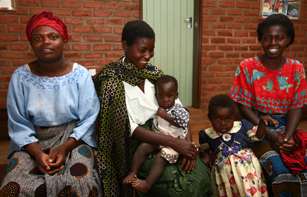
Feature Story
Integrating human rights, gender equality and HIV prevention in national HIV responses
27 September 2011
27 September 2011 27 September 2011
Credit: UNAIDS
UNAIDS brought together nearly 60 participants from 12 countries across Eastern and Southern Africa to a 3-day training workshop on expanding human rights, gender and HIV prevention programmes in national responses to HIV. The workshop took place in Johannesburg from 20 – 23 September.
Participants analysed how to incorporate into their National Strategic Plans (NSP) programmes that can reduce stigma, address gender inequality and increase access to justice in the context of HIV. The programmes reviewed were the ones identified in the 2011 Political Declaration, adopted by Member States at the UN High Level Meeting on AIDS, as essential to addressing HIV-related stigma and discrimination in national HIV responses.
Governments committed to implement programmes that focus on sensitizing police and judges; training health care workers in non-discrimination, confidentiality and informed consent; supporting national human rights learning campaigns, legal literacy, and legal services, as well as monitoring the impact of the legal environment on HIV prevention, treatment, care and support. They also committed to protect the rights of women and end gender-based violence in the context of HIV.
Participants agreed that HIV programmes based on human rights and gender equality are key means by which to make national AIDS responses more people-centered. “Unless the legal and social environments are protective of the people living with and vulnerable to HIV, people will not be willing, or able, to come forward for HIV prevention and treatment,” emphasized Sheila Tlou, Director of the UNAIDS Regional Support Team East and Southern Africa.
Unless the legal and social environments are protective of the people living with and vulnerable to HIV, people will not be willing, or able, to come forward for HIV prevention and treatment
Sheila Tlou, Director of the UNAIDS Regional Support Team East and Southern Africa.
During the workshop, each participating country team reviewed a human rights and gender analysis of their current National Strategic Plans produced ahead of the meeting by the International HIV/AIDS Alliance and Heard. These analyses confirmed results of earlier studies pointing out that human rights and gender equality are often cited in the introduction of the NSPs as important principles, and some programmes to support them may be mentioned. However, these programmes are often not included at the costing and budgeting phase, and when implemented, are seldom evaluated or taken to scale.
“It is imperative that we promote the incorporation of human rights and gender equality principles in our NSP. We need to move from mere acknowledgement of these principles to putting them at the forefront of the response to the HIV epidemic,” acknowledged Sylvie Pool from the Department of Legal Affairs of the Seychelles in representation of the country team.
By the end of the workshop, each country team had developed national action plans with specific commitments to integrate human rights and gender programmes in their NSP. Such commitments include the review of national strategic plans to identify human rights and gender gaps; costing of gender and human rights activities; training of civil society on human rights and gender issues so they can have better input into the national planning process; and mobilizing additional funding to implement HIV programmes with integrated human rights and gender principles.
“While integrating human rights and gender equality in the national AIDS strategic plan would appear challenging amidst competing priorities, it is possible!” saib Mr Lole Laile Lole, Chairman of the South Sudan Network of People living with HIV.
Participants in the workshop included technical experts involved in HIV strategic planning at country level, officials from national AIDS commissions, Ministries of Health, Gender and Planning, civil society organizations and people living with HIV. A wide range of facilitators also participated including UNDP, the Office of the High Commissioner for Human Rights, the World Bank, the International HIV/AIDS Alliance, Athena and Heard.
Countries selected to participate in the training were those currently engaged in adopting or revising national strategic plans to guide their response to the HIV epidemic. Two other such workshops will be held in 2011, one in Asia Pacific and one in the Middle East and North Africa.



